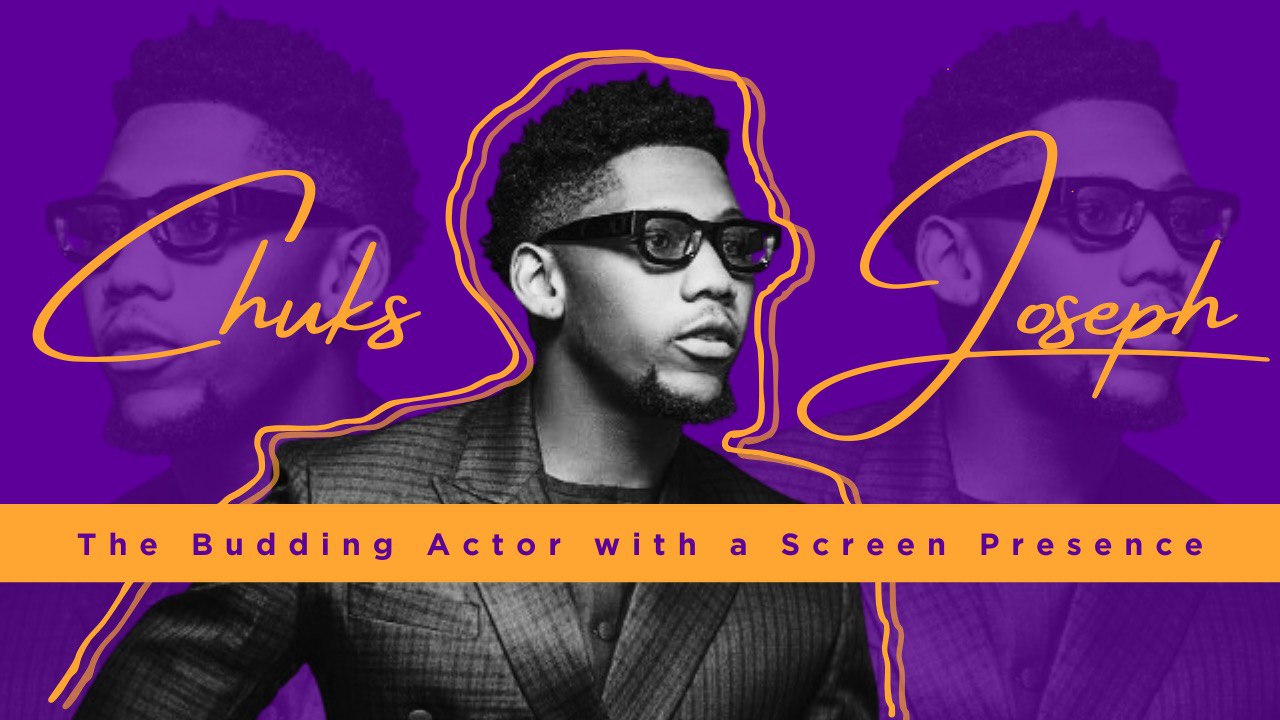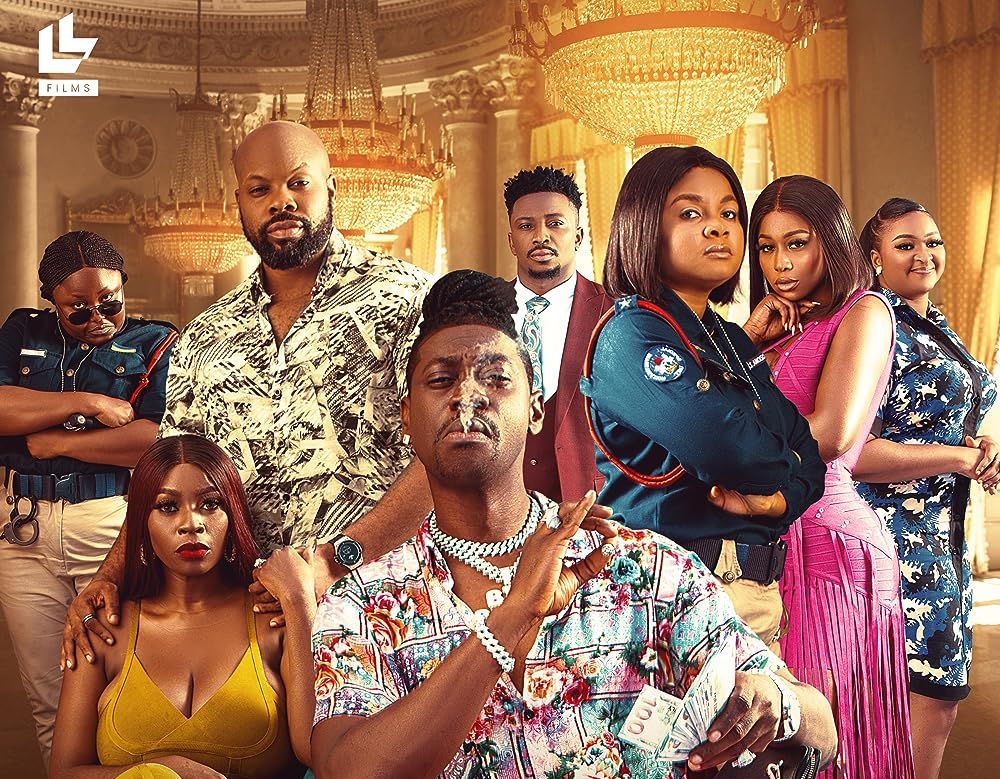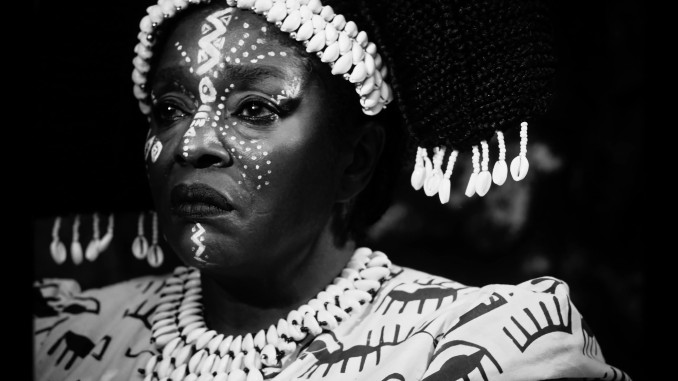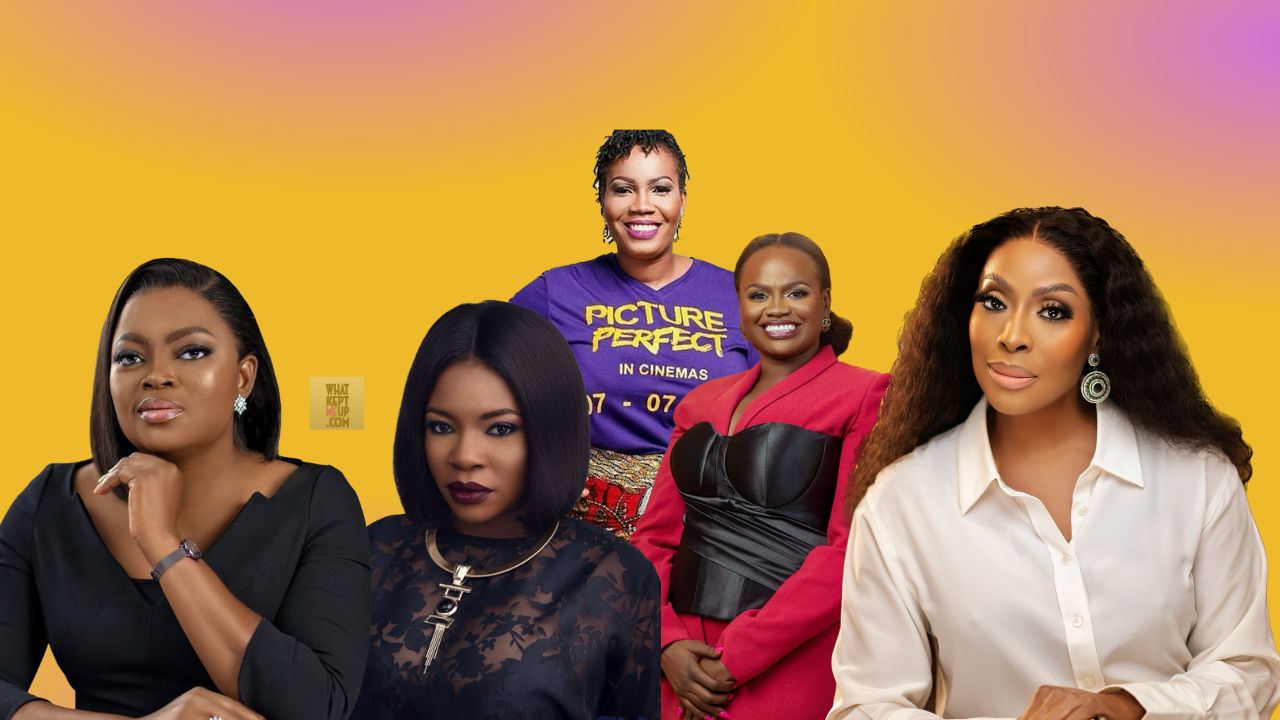Nollywood actor Chuks Joseph might be one of the busiest young actors in Nollywood right now. In addition to starring in Showmax Original Dead of Night, Anthill Studios‘ Criminal, and InkBlot Productions‘ recently released sports-themed When Love Strikes, he has two projects set to be released soon, including the upcoming season 5 of The Men’s Club. He is also shooting an undisclosed project while preparing to work on his next one.
“There is a script I am reading right now. I can’t wait to film it, hopefully, sometime next month, which will be a next-year release,” the actor tells me excitedly during our interview (which happened on a Saturday morning over Zoom not long after he wrapped a night shoot).
Joseph has been having an impressive run since he landed a “wakka-pass” role on the popular Flatmates TV series in 2020. Within four years, he has appeared in more than ten projects, quickly making a name for himself as an actor to watch out for with scene-stealing performances like the dreadful but charismatic Lashe in Jay Franklyn Jituboh’s The Origin: Madam Koi Koi and the street-smart and tad deceitful Obum in Kayode Kasum‘s Afamefuna: An Nwa Boi Story.
The actor opens up in this interview about his budding career, inspirations, the key to playing a magnetic villain, dream roles, and more.
This conversation has been edited and condensed for clarity.
Let’s go back to the beginning. How do you go from studying Microbiology, working with an NGO and research organisation during and after service, to acting?
I think it happened because it was supposed to happen. I completed my service in mid-2019 and was retained by my organisation to continue research work. The project wrapped up around December of that year, so I began applying for jobs at companies like Zenith Bank and KPMG. That same month, I went with a few friends to audition for a role on the popular TV series Flatmates. I was also going to interviews back and forth, but the job-hunting process was unfulfilling. So, I considered going back to modelling, maybe on a bigger scale, since I modelled in school and became MR SUG in my first year for the whole Federal University of Technology Owerri (FUTO). One of my friends encouraged the idea; he even got a form for me to be part of Mr Ideal Nigeria 2020, where I ended up being the first runner-up.
That same year, around April or May, I got a call from the Flatmates team letting me know I had gotten a “wakka-pass” role. I was so excited because I wasn’t even an actor. The whole process fascinated me, from getting the scripts and rehearsing to filming. At that time, simultaneously, I had already applied for Mr Ideal Nigeria, so when I became the first runner-up, I had the option of either doing a fashion thing for a couple of weeks or going to film school, Royal Arts Academy film school specifically.
My experience on the set of Flatmates had piqued my curiosity, so I chose the latter to see if it was something I could do. That’s where everything started for me. Film school started in October 2020, and I graduated two months later. I started going for auditions in January 2021 since I had gotten some training. I am not as shy as I used to be, but at the time, I was pretty reserved, so going to film school taught me how to do monologues and speak properly in front of people. I landed my first role that year. I got cast on Ndani’s Schooled in July or August, then Dark October in September, and that’s how everything started. I would say it is a case of serendipity; I was not exactly looking for something but stumbled on it and quickly fell in love with it.
Why was it necessary for you to go to film school?
I am not a control freak, but I like to be in control even if I’m not in total control of things happening around me; I like to be aware. I like to know my options and what I’m doing. After Royal Arts Academy, which was like an introduction to acting, I figured I needed more training to go far or be a bit different and better in general, so I went to EbonyLife Creative Academy that same 2021, around July. As a microbiology student, I learned certain things not during the lecture but when I went for practicals in the laboratory. I figured the same thing applied to acting. So, if I wanted to be a good actor, I needed to learn, train, and gain some hands-on knowledge. That’s why I went to EbonyLife Creative Academy; it was the best decision. There, I learned more things, including vulnerability. It was such an intense three months that changed how I approach acting and look at everything. It was me trying to be in control of this newfound career by learning new skills, acclimatising myself in this new space, and discovering some things in me while I was learning the craft.
Apart from Tizzy in Dark October and Lashe in Madam Koi Koi, most of your roles have been what some might call ‘small’ roles. What is your opinion on ‘small’ roles, and what’s your key to stealing the show in non-lead roles?
One thing our acting coach at EbonyLife Creative Academy used to say was that ‘there are no small roles only small-minded actors.’ When it comes to these seemingly small roles, as long as you have screen time and a part of the story, even if it’s a teeny weeny bit, you are very, very monumental in that story as long as you’re able to bring your character’s elements to life and make it believable so people can resonate with it. That’s how I approach those ‘small’ roles. When they come, and I see that I don’t have as much screen time, I ensure I Chop Am (Nigerian slang). I try to make the scripts more interesting. For instance, in that football discussion scene in Afamefuna, most of the things we did there were improvisation. I drew from my memories of passionate people arguing over football in school, in hostels, online and on the streets. I tried my best to bring all that to the scene so it felt relatable. There is no trick; I go into every project determined to do my best.
Going back to that football scene in Afamefuna, I am typically Afamefuna himself, who was eating and being quiet. That’s me in real life. I observe things a lot. Being an observer comes in handy when it’s time to play any role because I try to do things I have seen people do in similar situations in real life. I find what I like about what they did and look for elements of myself that match the character to play the role. I also think I have a presence. Once I walk into a place, I stand out, not because I’m the loudest or the finest or whatever. It’s just a blessing; I don’t take any glory for that, and I thank God for giving me that. So, I go into every situation trying to give my best performance, finding elements of myself that suit the character, seeking ways to play the role as naturally as possible and combining all of that with my natural presence.
How do these “small” roles build up to that big, undeniable leading role?
I think these ‘small’ roles go to show that I can do this. After seeing what I can do with just a few roles, people can tell I have what it takes. I think the timing for the release of Dark October wasn’t the greatest, with the elections around the corner, but it did what it did for the people who saw it. It made people pay attention to me. I am just happy to be here acting. So, if you want to make me the lead, I will take it and kill it. I will do the same if I only have a few lines. Over time, this has become my entire life. I have fallen so deeply in love with the process of acting and filmmaking that I don’t think I’ll stop doing this thing any time soon. It’s something I’m going to do for the long haul.
In the process, you have officially become Nollywood’s new bad boy. Did you set out to occupy that role?
I think it just happened because I never said I wanted to play those roles, from Madam Koi-Koi to Afamefuna to Criminal. I am not a bad guy in real life, so when I get scripts that require that, I find ways to play the character in the most natural way possible to deliver a believable performance. That’s something I have at the back of my mind whenever a new character comes by. I ask myself, ‘What am I doing? What’s my relationship with other characters? How will I play this in the most natural way possible?’
What is the science behind playing a charismatic villain we hate to love?
I treat it as work. As I mentioned, I worked for a research organisation, so I apply the same research skills whenever I’m about to play a new character. I forget Chuks, the nice guy. Then, I immerse myself in whoever I am playing; I list the qualities, take on the strong ones I can portray in my performance and hold on to them. For instance, in Madam Koi Koi, I focused on physicalities like moving slowly and looking at people condescendingly. So, people are caught off guard by my real-life persona because it doesn’t match the bad guy they saw onscreen. They expect me to be this bad guy who doesn’t smile and gives you 55 slaps in one minute. But they see me, and I am the total opposite, calm, and very chill. That’s the feedback I get from the people who have met me in real life. I think the contrast makes them appreciate the art more. People tell me, ‘Guy, I hated you in that film. I just wanted to reach through the screen and squeeze your neck, but I just want to hug you now that I’m seeing you.’
Are you actively trying to get out of the villain box?
Honestly, I am taking it one day at a time. Whether it’s a sidekick, bad guy, semi-bad guy or good guy, I am all for it as long as I can play in a way that seems as natural as possible. The word box gets thrown around a lot, but the truth is, if you do something and do it so well, people definitely want you to keep doing that. I understand that people might expect more bad roles because of what they saw me do in Madam Koi-Koi, Afamefuna, and Criminal, but the truth is that I am open to doing as many things as possible because there’s so much more to me. I’m ready to do whatever it takes if it works for the character. I loved what I did in Afamefuna with the Nwa Boi big clothes and rough hair. So, it’s just about what works for the character and what I can do, from shaving my hair to losing weight and looking tattered. When it comes to my characters, I am an open-minded canvas.
Let us dream a little. If you could play anyone, what would that character be?
I would love to play a doctor or a man of God who looks perfect on the outside but has secrets. A character slightly similar to the one in Bolanle Austen-Peters’ Man of God. Also, I would love to play a doctor with mental issues who is a master of his craft and has done ground-breaking things but occasionally makes mistakes that people overlook because of how skilled he is. I also want to play a military man, a young rebellious officer who doesn’t want to conform to how things are done. I want to shave my head and go bald. I just want roles with depth.
What’s next for you?
I am in the upcoming season 5 of The Men’s Club, which is already out of the bag with the recently released trailer. I also have a tech film where I play a very good boy, influencer, and soft boy, which is more like the real me. I am looking forward to the release of the movie because I can’t wait for people to see a different side of me.
Share your thoughts in the comments section or on our social media accounts.
Keep track of upcoming films and TV shows on your Google calendar.





